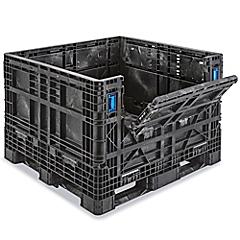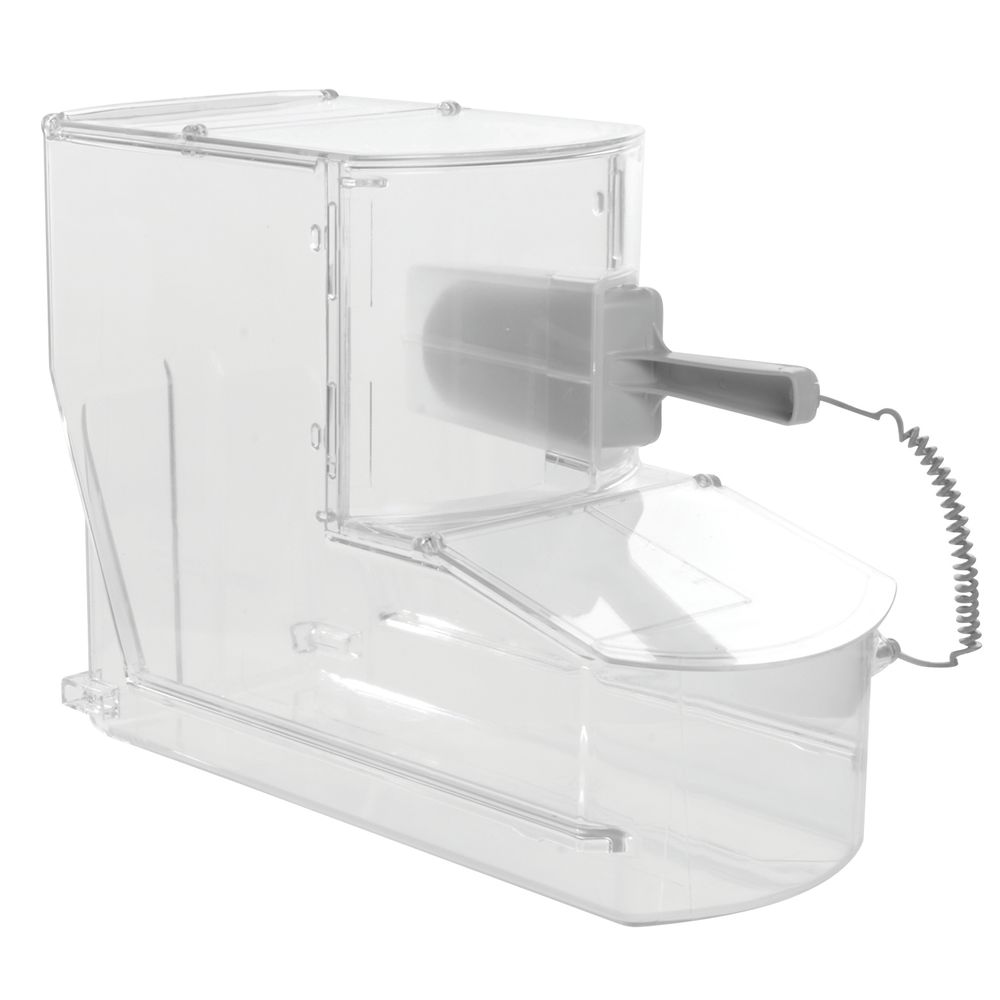A Comprehensive Guide to the Various Types of Mass Plastic Containers Available Today
Bulk plastic containers play an essential function in numerous sectors, providing solutions for storage space and transportation. Their diverse kinds cater to different needs, from inflexible choices for solid products to flexible containers suiting numerous forms. Each type presents distinctive benefits, making it necessary to understand their applications and functions. As markets develop, so do the needs for efficient container services. What elements should one consider when choosing the appropriate mass container?
Summary of Bulk Plastic Containers

Kinds Of Mass Plastic Containers
Bulk plastic containers been available in numerous types, each fit to details applications. Rigid bulk containers, adaptable bulk containers, and intermediate bulk containers stand for the main classifications, each offering one-of-a-kind advantages. Understanding these kinds is necessary for picking the best container for moving and storing products.

Inflexible Mass Containers
Inflexible bulk containers are essential for reliable storage and transport of various products throughout sectors. These containers are commonly created from sturdy plastics, allowing them to withstand extreme handling and ecological conditions. They can be found in numerous sizes and shapes, including totes, drums, and containers, making them ideal for saving whatever from granular substances to fluids. Rigid containers usually include strengthened wall surfaces and protected lids, making certain the components stay protected during transit. Their stackable style makes the most of storage room, making them perfect for warehouses and producing facilities. In addition, many inflexible bulk containers are recyclable and recyclable, adding to sustainability efforts. Overall, their robustness and convenience make rigid mass containers an important element in supply chain procedures.
Versatile Bulk Containers
Adaptable mass containers, commonly described as flexible intermediate bulk containers (FIBCs), act as a versatile solution for keeping a range and carrying of dry products. These containers are commonly made from woven polypropylene and are made to be lightweight yet strong, enabling effective handling and piling. Their flexibility allows them to fit numerous sizes and shapes, making them suitable for items ranging from grains to chemicals. FIBCs can be geared up with functions such as spouts for easy filling and discharge, along with safety coatings for boosted longevity. Furthermore, they are multiple-use and recyclable, adding to lasting methods in industries like agriculture, food processing, and building. In general, adaptable mass containers offer a cost-effective and reliable option for bulk material administration.
Intermediate Bulk Containers
Intermediate bulk containers (IBCs) are crucial for the effective transportation and storage of fluids and granular materials across numerous sectors. These containers usually have a capability varying from 275 to 330 gallons and are made for very easy stacking and taking care of. Made from sturdy products like high-density polyethylene or steel, IBCs provide excellent defense against contamination and ecological factors. Their style includes functions such as an integrated pallet for forklift gain access to and a detachable top for very easy filling and cleansing. IBCs are commonly used in chemical, food, and pharmaceutical industries, making sure conformity with safety guidelines. Their flexibility and reusability make them an affordable solution for bulk storage space and transportation, adding to supply chain performance and sustainability.
Features and Benefits of Mass Plastic Containers
Mass plastic containers are essential tools in numerous industries, supplying a mix of sturdiness and practicality. These containers are created from top quality products, making them immune to influences, chemicals, and environmental variables. This robustness guarantees product safety and security during storage and transport.
In addition, mass plastic containers are lightweight, helping with convenience of taking care of and decreasing delivery expenses. Their stackable design makes the most of storage efficiency, allowing for optimized warehouse area. Numerous designs feature secure lids or closures, providing a closed seal that protects against and maintains components contamination.
Mass plastic containers are usually recyclable and recyclable, adding to lasting methods. Their flexibility permits a large range of applications, from food storage to commercial use, improving their worth across markets. Companies take advantage of the lengthy life-span and low maintenance requirements of these containers, making them a cost-effective option for both long-lasting and temporary needs.
Industries That Use Bulk Plastic Containers
Different sectors gain from using bulk plastic containers, each leveraging their distinct residential properties for certain applications. The food and beverage market counts on these containers for secure storage and transport of products, while the chemical manufacturing field utilizes them for handling hazardous products. Additionally, the pharmaceutical distribution requires highlight the value of resilience and tidiness in packaging solutions.
Food and Drink Market
As the demand for effective and risk-free storage space options remains to increase, the food and drink industry significantly relies upon mass plastic containers for their functional requirements. These containers give durable, light-weight, and Resources versatile options for storing active ingredients, finished items, and waste products. Made from food-grade materials, they ensure conformity with health and wellness requirements. Different layouts, such as stackable bins and carry boxes, maximize space throughout transportation and storage space, improving logistical effectiveness. Additionally, the openness of some mass containers allows for easy supply management, decreasing the threat of perishing. With the market's concentrate on sustainability, many suppliers are currently using recyclable and recyclable choices, lining up with eco-friendly methods while fulfilling the high needs of food safety and security and health.
Chemical Production Market
The chemical production field depends heavily on bulk plastic containers for the effective and safe storage space of raw materials, intermediates, and ended up products. These containers are developed to hold up against various chemicals, making sure that dangerous products do not leakage or deteriorate the container itself. Common kinds consist of high-density polyethylene (HDPE) and polypropylene containers, which provide outstanding chemical resistance and sturdiness. Their lightweight nature and stackable design promote transportation and storage space, enhancing space in making centers. Additionally, many mass index plastic containers include attributes such as tamper-evident seals and easy-to-read labeling, boosting safety and conformity with market regulations. On the whole, bulk plastic containers are integral to the chemical manufacturing procedure, supplying reliable options for dealing with varied substances.
Drug Circulation Requirements
Pharmaceutical distribution depends on bulk plastic containers to meet strict safety and security and governing requirements. These containers are necessary for storing a variety and moving of pharmaceutical items, consisting of active pharmaceutical active ingredients (APIs) and ended up medications. Their style assurances protection against dampness, light, and contamination, maintaining the stability of sensitive materials. Furthermore, bulk plastic containers are certified with market requirements such as Great Manufacturing Practices (GMP) and are frequently made from products that are FDA-approved. Using these containers enhances effectiveness in the supply chain, permitting secure, massive circulation while minimizing waste. Business in the pharmaceutical market focus on using resilient, leak-proof, and tamper-evident containers to assure product safety and security and high quality throughout the logistics procedure.
Considerations for Choosing the Right Container
When picking the proper mass plastic container, numerous factors must be very carefully weighed to assure perfect performance and security. The nature of the products to be kept is extremely important; compatibility with the container's product can influence stability and safety and security. plastic bulk containers. In addition, the container's shapes and size must align with the storage space and transport requirements, guaranteeing effective area usage
Load capacity is an additional crucial factor to consider, as it needs to accommodate the weight of materials without threat of damage or failure. The layout functions, such as airing vent or lids, can impact usability and accessibility. Compliance with industry guidelines is crucial, particularly in sectors like drugs, where security standards are stringent.
Lastly, the expected lifespan and longevity of the container need to be analyzed to validate it satisfies the functional demands without constant substitute. By evaluating these variables, one can choose one of the most suitable bulk plastic container for specific applications.
Ecological Impact and Sustainability
As services increasingly prioritize sustainability, the environmental impact of mass plastic containers has actually come under scrutiny. These containers, go to this site typically made from products such as polyethylene or polypropylene, add substantially to plastic waste if not taken care of effectively. Their manufacturing includes the usage of nonrenewable fuel sources, which can lead to boosted greenhouse gas emissions. Developments in recycling technology and the growth of naturally degradable options are helping to alleviate these worries.
Moreover, several makers are taking on practices that stress the use of recycled products, thus lowering the need for virgin plastics. The durability of mass plastic containers likewise plays a role; they are made to be reused numerous times, which can lessen their general ecological impact when contrasted to single-use options. Eventually, the market deals with the challenge of balancing functionality with ecological obligation, making lasting practices crucial for the future of mass plastic containers.
Ideal Practices for Storage and Transportation
Efficient storage and transport of mass plastic containers substantially affect both operational performance and sustainability. To make best use of room, organizations must stack containers securely, assuring stability and preventing damages. Appropriate labeling is essential for easy identification, which streamlines access processes. In addition, maintaining a orderly and tidy storage area decreases the danger of contamination and improves safety and security.
For transport, selecting the appropriate automobile is crucial; containers should be protected to avoid moving throughout transportation. Firms ought to likewise consider using pallets to facilitate much easier loading and unloading. Normal assessments of containers for deterioration can avoid expensive substitutes.
Temperature level control is one more vital facet, as extreme problems can jeopardize the integrity of the plastic. Training personnel on best techniques for taking care of and transport guarantees conformity and advertises a society of safety and security. By carrying out these best methods, organizations can improve their functional efficiency while adding to environmental sustainability.
Regularly Asked Concerns
Just how Do I Clean Bulk Plastic Containers Successfully?
To tidy bulk plastic containers properly, one need to wash them with cozy water, utilize a moderate detergent and scrub with a soft brush. Wash thoroughly, after that enable to air completely dry totally prior to storage space or reuse.
What Is the Lifespan of Bulk Plastic Containers?
The life-span of mass plastic containers typically varies from 5 to one decade, depending on the product, use, and ecological problems. Appropriate upkeep and storage can significantly prolong their use and sturdiness in time.
Can Bulk Plastic Containers Be Custom-made?

Do Mass Plastic Containers Have Guarantee Options?

Exist Laws for Making Use Of Bulk Plastic Containers?
Yes, guidelines exist for utilizing bulk plastic containers, primarily concentrated on security, ecological influence, and product compliance. These laws ensure that containers meet industry standards and appropriate for transporting numerous compounds safely and successfully.
Rigid bulk containers, flexible bulk containers, and intermediate bulk containers represent the main groups, each offering special benefits. Flexible mass containers, typically referred to as flexible intermediate bulk containers (FIBCs), offer as a versatile service for transporting and storing a variety of dry materials. The chemical manufacturing sector depends greatly on bulk plastic containers for the efficient and safe storage of raw materials, intermediates, and finished items. Bulk Plastic Containers. These containers are designed to withstand different chemicals, ensuring that harmful products do not leakage or deteriorate the container itself. Additionally, bulk plastic containers are certified with industry standards such as Good Manufacturing Practices (GMP) and are typically made from products that are FDA-approved